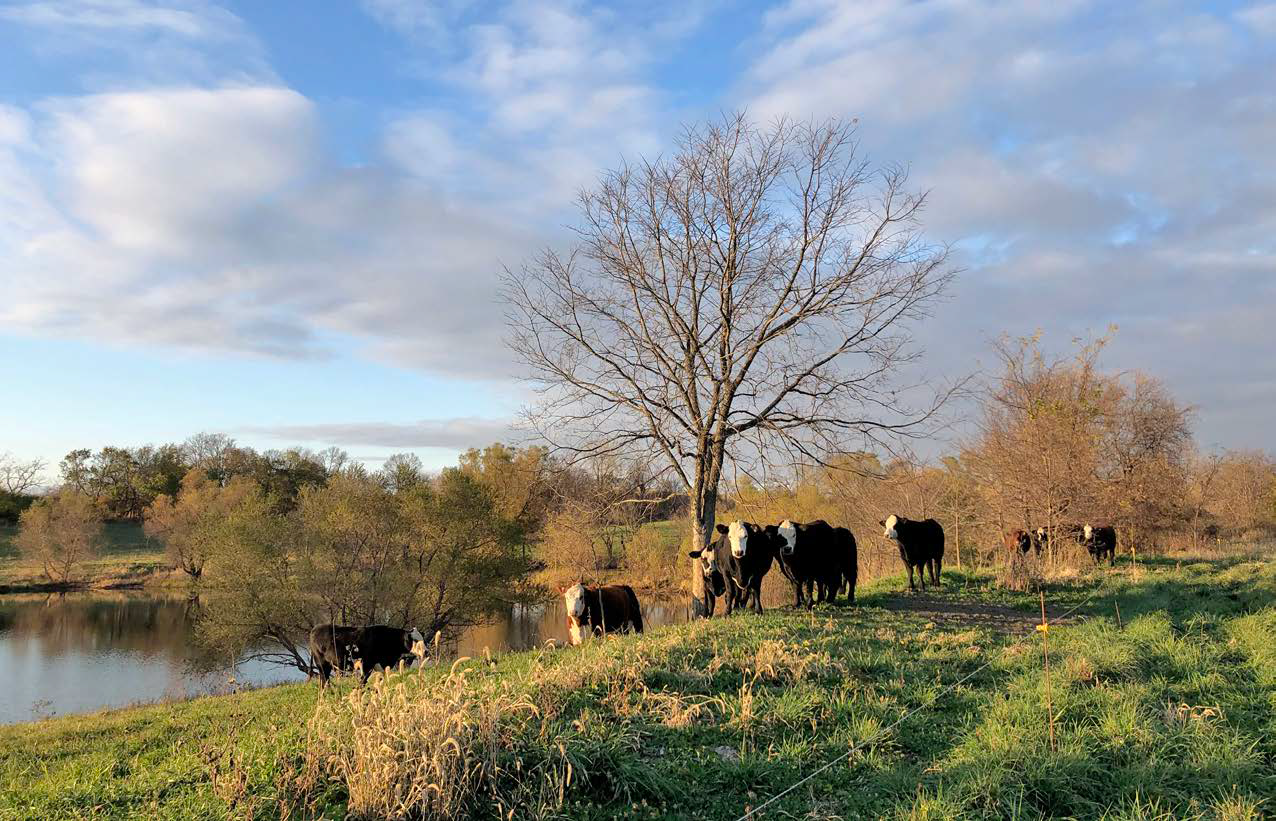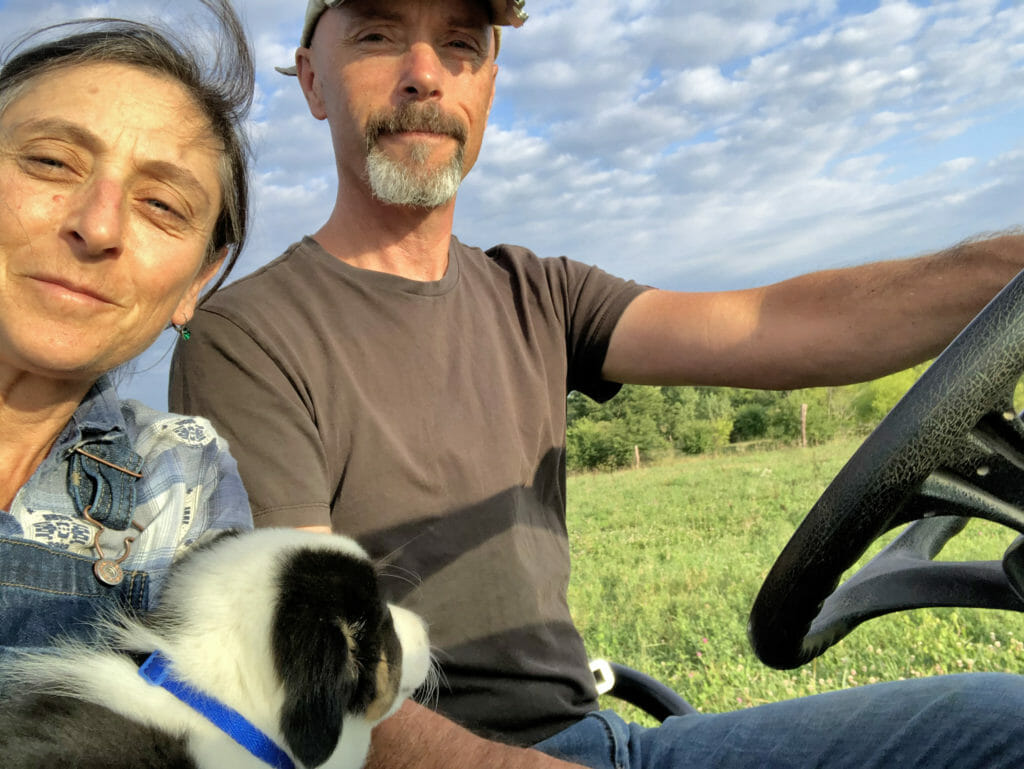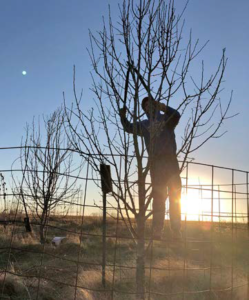Working Together for a Hopeful Future
PFI members Beth Hoffman and John Hogeland, of Whippoorwill Creek Farm, are beginning farmers in Monroe County, Iowa.
The pair has been involved in PFI beginning farmer programming, field days, the annual conference and the Cooperator’s Meeting. Passionate about sustainable agriculture and food systems, Beth and John left San Francisco in 2019 for John’s family farm. Now, they are working to apply the lessons they’ve learned to build a sustainable farm that adds diversity to the landscape.
The Backstory
Whippoorwill Creek Farm is rich in history. The land holds the story of a once diversified agriculture landscape and how it changed in tandem with the ebbs and flows of agricultural policy, values and broader societal change. Now, the land offers a glimpse of how that diversified landscape can be restored as a new generation of farmers seeks to rebuild the links between farm, ecosystem and community.
John Hogeland grew up there, watching his dad farm multiple enterprises: pastured pork, cattle, corn, soybeans and the occasional small-grain crop. Around fifth grade, his dad became part of MoCo 10, one of the first hog concentrated animal feeding operations in Iowa, and the farm changed.
“I saw how damaging it was in a lot of different ways,” John says. “It was hard on the pigs, hard on my dad, hard on his health and really hard on the local economy because up to that point, all of our neighbors raised a few pigs.”

Cattle graze on grass their whole lives at Whippoorwill Creek Farm, operated by Beth Hoffman and John Hogeland near Lovillia, Iowa.
In search of something better, John left the farm, moving first to Wyoming, then to San Francisco. He attended culinary school and worked as a chef, a wine buyer and then a butcher, all roles where he found himself consistently surrounded by an array of fresh produce and high-quality meats. In San Francisco, he met Beth. Beth Hoffman was born in Queens, New York, and grew up in New Jersey. She studied anthropology in college and journalism in graduate school at University of California, Berkley. Her love of cultures, intertwined with food and racial equity issues in the food system, propelled her to report on food as a journalist.
“Race and economic issues are critical ways to think about the food system,” Beth says.
While their paths differed, Beth’s and John’s experiences ultimately developed into a passion for agricultural equity and fostered a deeper relationship with food and the communities it creates. These are values they brought back to the farm in Iowa.
Returning to the Farm
John and Beth currently raise grass-finished beef and have added goats to also help with brush management on the farm. But farming is not easy, as Beth outlined in her book “Bet the Farm: The Dollars and Sense of Growing Food in America.” Today, the couple continues to strive to better the landscape by mimicking natural systems. For them, community support is a necessity for beginning farmers to succeed and for future aspiring farmers to gain entry to the profession.
“There’s very limited access. The people who have farms stay on farms,” Beth says. “Those are the families who get to farm. And a lot of families out there don’t get the opportunity to be in rural communities, to be outside of cities.”
“Socially, we want the farm to be a place where we can bring a lot of people together.” – Beth Hoffman
While consolidated operations can more easily rely on subsidies and take greater risks, farms operating outside of this norm do not benefit from the same safety net. Because of this disparity, Beth says, the pair is working hard to bring other people onto Whippoorwill Creek Farm with them.
The Vision
This experience of trying to start a farm – and to do so sustainably – has inspired Beth and John’s long-term vision for the farm. They are working to build the farm into an environmentally, financially and socially sustainable business. They argue this change is most needed in Iowa, where “most farms consist of corn and soybeans planted in a landscape that once supported greater ecological diversity,” as well as many diverse farming enterprises. “This is where theories about how we can diversify crops and to attract new farmers need to be played out,” Beth says. “This is where the change needs to happen.”
As part of their longer-term farm goals, the couple hopes to have many farmers on their land working alongside each other on their own enterprises, raising a variety of crops and livestock and welcoming in the next generation of beginning farmers. “Socially, we want the farm to be a place that attracts people to work together,” Beth says. “The landscape benefits when a multitude of different species and practices can take place on it.”
As part of this vision, Beth and John want their land to someday enable beginning farmers to remain independent, make their own decisions and not feel compelled to sacrifice ownership in the system for financial survival, as John’s father experienced with his hogs.
“We’re privileged to be able to farm this land,” Beth says. “We’re not using it all and it could be much better utilized by having more people here. In fact, most farms have the capacity to have more people doing more things on them.”
For Beth, sustainable farming is about building a holistic unity between the farm and the broader context – between the individual people, the knowledge and practices and the community. “Let’s band together and support each other,” she says. “Not in going out of business and watching our land sell to the highest bidder. But in working together to stay in business.”
As John and Beth work towards their long-term farm goals, they are buoyed by the vision of vibrant communities that are full of people, rooted in healthy landscapes and have busy town squares, funded schools and small farms.
Such a vision is possible, they say, “when we live and work for it” – and it’s this vision they left San Francisco to pursue.
In 2021, Beth Hoffman published “Bet the Farm: The Dollars and Sense of Growing Food in America,” which chronicles the transition she and John made from urban-based careers on the West Coast to starting a farm in rural Iowa, the struggles they encountered and the broader challenges of starting a farm today.


